29 apr 2016

40,000 Palestinians in Gaza Strip suffer from diabetes, half of them are women, UNRWA said in a new report issued on the occasion of World Health Day.
The Gaza Strip is an environment where malnutrition and infectious diseases can coexist with non-communicable health conditions such as obesity, hypertension and diabetes.
Forced urbanization, over-crowding and the related psychosocial stress can aggravate these diseases, the report said.
According to the UNRWA health program in Gaza, in 2015, approximately 12.2 per cent of Palestinian refugees aged 40 years or more were suffering from diabetes. In total, the UNRWA health program in Gaza reported 16,889 male and 23,118 female Palestinian refugee diabetes patients in 2015.
Through the provision of basic health care in its health centers, as well as regular awareness sessions for the community, UNRWA is working towards Sustainable Development Goal 3 – good health and well-being – which calls for the reduction of premature death from non-communicable diseases, including diabetes, by 30 per cent by 2030.
According to the World Health Organization (WHO), the number of people living with diabetes globally has almost quadrupled since 1980 to 422 million adults, with most living in developing countries.
The Gaza Strip is an environment where malnutrition and infectious diseases can coexist with non-communicable health conditions such as obesity, hypertension and diabetes.
Forced urbanization, over-crowding and the related psychosocial stress can aggravate these diseases, the report said.
According to the UNRWA health program in Gaza, in 2015, approximately 12.2 per cent of Palestinian refugees aged 40 years or more were suffering from diabetes. In total, the UNRWA health program in Gaza reported 16,889 male and 23,118 female Palestinian refugee diabetes patients in 2015.
Through the provision of basic health care in its health centers, as well as regular awareness sessions for the community, UNRWA is working towards Sustainable Development Goal 3 – good health and well-being – which calls for the reduction of premature death from non-communicable diseases, including diabetes, by 30 per cent by 2030.
According to the World Health Organization (WHO), the number of people living with diabetes globally has almost quadrupled since 1980 to 422 million adults, with most living in developing countries.
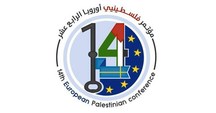
International, Arab and Palestinian key figures affirmed their participation in 14th Palestinians in Europe Conference which is to be held on May 07 in the Swedish city of Malmo.
The activist Khalil Aasi, Deputy Head of the preparatory committee of the conference, said that participants include Palestine’s ambassador to Sweden, European MPs from Sweden, Ireland, Spain and members of the British House of Lords.
For his part, Majed Hannoun, member of the conference management and president of the Palestinian Assembly in Italy, confirmed the participation of Morocco’s Former Foreign Minister Saad al-Din al-Othmani in addition to pressmen and syndicate representatives of different Arab nationalities.
Khamis Kart, member of the conference management and member of the administrative staff of the Palestinian assembly in Germany, confirmed the attendance of Muslim and Christian religious figures as well as academicians, parliamentarians, politicians and human rights activists. Researchers and academicians from the Arab gulf countries are going to participate in the conference as well.
Isam Qaddoura member of the conference administration and former president of the Palestinian forum in Denmark affirmed the participation of many of Islamic institutions and organizations in addition to Arab activists in Europe.
The activist Khalil Aasi, Deputy Head of the preparatory committee of the conference, said that participants include Palestine’s ambassador to Sweden, European MPs from Sweden, Ireland, Spain and members of the British House of Lords.
For his part, Majed Hannoun, member of the conference management and president of the Palestinian Assembly in Italy, confirmed the participation of Morocco’s Former Foreign Minister Saad al-Din al-Othmani in addition to pressmen and syndicate representatives of different Arab nationalities.
Khamis Kart, member of the conference management and member of the administrative staff of the Palestinian assembly in Germany, confirmed the attendance of Muslim and Christian religious figures as well as academicians, parliamentarians, politicians and human rights activists. Researchers and academicians from the Arab gulf countries are going to participate in the conference as well.
Isam Qaddoura member of the conference administration and former president of the Palestinian forum in Denmark affirmed the participation of many of Islamic institutions and organizations in addition to Arab activists in Europe.
23 apr 2016
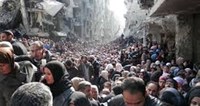
Spokesman for UNRWA Sami Mushasha expressed deep concern over the deteriorating humanitarian situation in Yarmouk Palestinian refugee camp in Damascus.
For the first time since the outbreak of the intense armed conflict inside Yarmouk on 6 April, the refugee camp is starting to witness some calm for the third consecutive day.
However, civilians in Yarmouk are still in deep trauma, Mushasha said. He pointed out that the highly intense fighting did not only cause civilian casualties and fatalities, but has also acutely aggravated shortages of food and clean water for the approximately 6,000 civilian families residing in Yarmouk.
He affirmed that UNRWA staffers have managed to distribute food parcels and blankets between 9-15 March to support families in need of assistance in Yarmouk, Yalda, Babila and Beit Saham. UNRWA is anxiously monitoring the situation with a view to continue its humanitarian mission to support civilians in the Yarmouk-Yalda area.
For the first time since the outbreak of the intense armed conflict inside Yarmouk on 6 April, the refugee camp is starting to witness some calm for the third consecutive day.
However, civilians in Yarmouk are still in deep trauma, Mushasha said. He pointed out that the highly intense fighting did not only cause civilian casualties and fatalities, but has also acutely aggravated shortages of food and clean water for the approximately 6,000 civilian families residing in Yarmouk.
He affirmed that UNRWA staffers have managed to distribute food parcels and blankets between 9-15 March to support families in need of assistance in Yarmouk, Yalda, Babila and Beit Saham. UNRWA is anxiously monitoring the situation with a view to continue its humanitarian mission to support civilians in the Yarmouk-Yalda area.
19 apr 2016
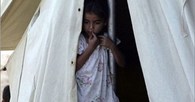
Senior Hamas official Ahmed Abdul-Hadi said that initial talks were held on Monday at the headquarters of the Lebanese general security in Beirut between officials from Palestinian factions and the UNRWA.
Abdul-Hadi, deputy director of Hamas's political relations in Lebanon, added that the meetings with the UNRWA are aimed at fulfilling the demands of the Palestinian refugees in Lebanon and giving them their basic rights.
He stated that the talks with the UNRWA are backed by the ongoing popular protests, which are organized by Palestinian factions and groups in Lebanon.
He affirmed that the preliminary talks between the two sides were transparent and responsible, pointing to another meeting to be held with the UNRWA next Thursday at the Palestinian embassy.
Abdul-Hadi, deputy director of Hamas's political relations in Lebanon, added that the meetings with the UNRWA are aimed at fulfilling the demands of the Palestinian refugees in Lebanon and giving them their basic rights.
He stated that the talks with the UNRWA are backed by the ongoing popular protests, which are organized by Palestinian factions and groups in Lebanon.
He affirmed that the preliminary talks between the two sides were transparent and responsible, pointing to another meeting to be held with the UNRWA next Thursday at the Palestinian embassy.
16 apr 2016
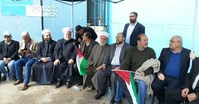
The United Nations Relief and Works Agency for Palestine Refugees in the Near East (UNRWA) decided to suspend its decision to reduce medical services to Palestinian refugees in Lebanon.
The decision came in response to the Palestinian refugees’ protests that continued outside the UNRWA headquarters in Lebanon for 100 running days.
The Crisis Management Cell, a follow-up committee recently formed by Palestinian leaderships in Lebanon following UNRWA’ reduction decision, described the agency’s decision to suspend its aid cuts as “major achievement that was accomplished thanks to the popular protests in Palestinian camps.”
The cell hailed the efforts made by local popular committees and youths movements that played a major role in pressuring the UNRWA administration. It also welcomed the dialogue scheduled to be held next Monday between Palestinian political leaders in Lebanon and the UNRWA’s administration under the auspices of the General Directorate of the Lebanese Security and Special Coordinator of the Secretary-General for Lebanon Sigrid Kaag.
Along the same line, the crisis cell extended the suspension of the closure of UNRWA’s offices in Lebanon in order to provide an appropriate environment for the planned dialogue.
UNRWA Director in Lebanon Matthias Schmale’s entry to Palestinian refugee camps will remain banned unless his unfair decisions and measures against Palestinian refugees are canceled, according to the crisis cell’s statement. UNRWA had earlier decided to reduce its aid allocated for Palestinian refugees in Lebanon.
The Palestinian refugee in Lebanon has to pay 20 percent of hospitalization costs in government, NGO, and private hospitals. There are more than 480,000 Palestinians registered in Lebanon with UNRWA, most of them live in squalid conditions in 12 official refugee camps and facing a variety of legal restrictions, including on their employment.
The decision came in response to the Palestinian refugees’ protests that continued outside the UNRWA headquarters in Lebanon for 100 running days.
The Crisis Management Cell, a follow-up committee recently formed by Palestinian leaderships in Lebanon following UNRWA’ reduction decision, described the agency’s decision to suspend its aid cuts as “major achievement that was accomplished thanks to the popular protests in Palestinian camps.”
The cell hailed the efforts made by local popular committees and youths movements that played a major role in pressuring the UNRWA administration. It also welcomed the dialogue scheduled to be held next Monday between Palestinian political leaders in Lebanon and the UNRWA’s administration under the auspices of the General Directorate of the Lebanese Security and Special Coordinator of the Secretary-General for Lebanon Sigrid Kaag.
Along the same line, the crisis cell extended the suspension of the closure of UNRWA’s offices in Lebanon in order to provide an appropriate environment for the planned dialogue.
UNRWA Director in Lebanon Matthias Schmale’s entry to Palestinian refugee camps will remain banned unless his unfair decisions and measures against Palestinian refugees are canceled, according to the crisis cell’s statement. UNRWA had earlier decided to reduce its aid allocated for Palestinian refugees in Lebanon.
The Palestinian refugee in Lebanon has to pay 20 percent of hospitalization costs in government, NGO, and private hospitals. There are more than 480,000 Palestinians registered in Lebanon with UNRWA, most of them live in squalid conditions in 12 official refugee camps and facing a variety of legal restrictions, including on their employment.
15 apr 2016
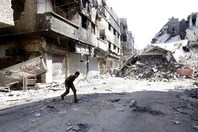
Fighting between the Islamic State group (IS) and al-Nusra Front in Yarmouk refugee camp in southern Damascus has left thousands of Palestinians trapped in their homes, in the latest crisis to strike what was once Syria's largest Palestinian refugee camp.
The Jafra Foundation, a Yarmouk-based humanitarian organization, said Wednesday that deadly clashes erupted on April 7 and continued through the week, accompanied by heavy shelling from Syrian regime forces as well as armed Palestinian groups.
At least four civilians have been killed -- including two who were beheaded by IS fighters -- and another five civilians, including children, were wounded by sniper fire, the organization said. Some 20 buildings were also burned Tuesday, including a hospital.
IS forces have taken over the majority of Yarmouk, besieging the al-Qaeda-affiliated al-Nusra Front in certain areas in a struggle that has carved up the camp. Some 2,500 Palestinian families have been trapped inside their homes due to the fighting, without food or water.
Yarmouk used to be home to nearly 200,000 people, the majority Palestinian refugees, but after two years of a Syrian regime siege, followed by the incursion of IS into the camp, the vast majority were forced to flee. The Jafra Foundation estimates some 5,000 to 8,000 residents remain.
The regime's siege and deadly fighting has forced Yarmouk residents to rely entirely on humanitarian aid, but fighting has made aid delivery nearly impossible over the past three years.
Aid groups in February gained access to areas of Damascus neighboring the camp, with Yarmouk residents managing to receive aid by travelling to the suburb of Yalda, as well as Babila and Beit Saham.
However, IS has held control of the checkpoint leading from Yarmouk to Yalda since April 7, and the Jafra Foundation reported that no civilians have been able to exit the camp since.
Water has been cut off from the majority of the camp as a result of the week's fighting and residents say any available water is contaminated, infecting many with hepatitis or typhoid. Due to access restrictions, medics in the camp have been unable to remove bodies of those killed in clashes from the streets.
IS forces initially gained a footing in the camp in April last year with the assistance of al-Nusra Front, but the extremist group is now pitted against al-Nusra as well as armed Palestinian groups inside the camp.
The Jafra Foundation reported that IS and al-Nusra have not been damaged by the government's ongoing siege on the camp, with both groups maintaining a supply of provisions and weapons.
Yarmouk's residents have called on the PLO, Palestinian factions, and the UN agency for Palestinian refugees (UNRWA) to take responsibility for their dire situation.
In the West Bank, PLO Secretary-General Saeb Erekat on Thursday demanded that the international community provide protection to Palestinians in Yarmouk, saying that IS and al-Nusra were "exterminating innocent civilians."
He extended his condolences for the deaths of three Palestinians killed in the recent fighting, identified as Muhammad Amairi, Ahmad Hamdan, and Muhammad Ali.
"The solution is not in taking Palestinian refugees into European or other countries or new refugee camps, but in bringing them back to their home country that they were forcefully displaced from in 1948," he said, a proposal rejected by the Israeli authorities.
Erekat said Palestinians are "still paying the price of (the Israeli) occupation and conflict wherever they are."
The Syrian conflict began in the form of peaceful protests in March 2011 and quickly morphed into a civil war, leaving more than 300,000 people dead and millions displaced since.
Over half a million Palestinians lived across nine refugee camps prior to the war, the descendants of the some 750,000 Palestinians expelled from their homes during the establishment of Israel. Syria's civil war has seen many of these families displaced a second time, and around 50,000 Palestinians have fled the country.
The Jafra Foundation, a Yarmouk-based humanitarian organization, said Wednesday that deadly clashes erupted on April 7 and continued through the week, accompanied by heavy shelling from Syrian regime forces as well as armed Palestinian groups.
At least four civilians have been killed -- including two who were beheaded by IS fighters -- and another five civilians, including children, were wounded by sniper fire, the organization said. Some 20 buildings were also burned Tuesday, including a hospital.
IS forces have taken over the majority of Yarmouk, besieging the al-Qaeda-affiliated al-Nusra Front in certain areas in a struggle that has carved up the camp. Some 2,500 Palestinian families have been trapped inside their homes due to the fighting, without food or water.
Yarmouk used to be home to nearly 200,000 people, the majority Palestinian refugees, but after two years of a Syrian regime siege, followed by the incursion of IS into the camp, the vast majority were forced to flee. The Jafra Foundation estimates some 5,000 to 8,000 residents remain.
The regime's siege and deadly fighting has forced Yarmouk residents to rely entirely on humanitarian aid, but fighting has made aid delivery nearly impossible over the past three years.
Aid groups in February gained access to areas of Damascus neighboring the camp, with Yarmouk residents managing to receive aid by travelling to the suburb of Yalda, as well as Babila and Beit Saham.
However, IS has held control of the checkpoint leading from Yarmouk to Yalda since April 7, and the Jafra Foundation reported that no civilians have been able to exit the camp since.
Water has been cut off from the majority of the camp as a result of the week's fighting and residents say any available water is contaminated, infecting many with hepatitis or typhoid. Due to access restrictions, medics in the camp have been unable to remove bodies of those killed in clashes from the streets.
IS forces initially gained a footing in the camp in April last year with the assistance of al-Nusra Front, but the extremist group is now pitted against al-Nusra as well as armed Palestinian groups inside the camp.
The Jafra Foundation reported that IS and al-Nusra have not been damaged by the government's ongoing siege on the camp, with both groups maintaining a supply of provisions and weapons.
Yarmouk's residents have called on the PLO, Palestinian factions, and the UN agency for Palestinian refugees (UNRWA) to take responsibility for their dire situation.
In the West Bank, PLO Secretary-General Saeb Erekat on Thursday demanded that the international community provide protection to Palestinians in Yarmouk, saying that IS and al-Nusra were "exterminating innocent civilians."
He extended his condolences for the deaths of three Palestinians killed in the recent fighting, identified as Muhammad Amairi, Ahmad Hamdan, and Muhammad Ali.
"The solution is not in taking Palestinian refugees into European or other countries or new refugee camps, but in bringing them back to their home country that they were forcefully displaced from in 1948," he said, a proposal rejected by the Israeli authorities.
Erekat said Palestinians are "still paying the price of (the Israeli) occupation and conflict wherever they are."
The Syrian conflict began in the form of peaceful protests in March 2011 and quickly morphed into a civil war, leaving more than 300,000 people dead and millions displaced since.
Over half a million Palestinians lived across nine refugee camps prior to the war, the descendants of the some 750,000 Palestinians expelled from their homes during the establishment of Israel. Syria's civil war has seen many of these families displaced a second time, and around 50,000 Palestinians have fled the country.
12 apr 2016
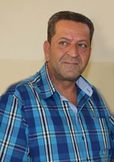
Fatah senior military official Fathi Zeidan was assassinated Tuesday in a car bombing at the entrance to Ein al-Hilweh refugee camp in the southern Lebanese city of Sidon, Lebanese security sources revealed.
Anatolia news agency quoted the Lebanese security sources as saying that Fatah military official in Mieh Mieh refugee camp Fathi Zeidan was killed when his car was blown up at the entrance to the Ein al-Hilweh camp.
The sources pointed out that a state of alert was declared by Fatah faction in Ein al-Hilweh, Lebanon's largest Palestinian refugee camp, following the explosion.
There are more than 450,000 Palestinians registered in Lebanon with UNRWA, most of them live in squalid conditions in 12 official refugee camps and facing a variety of legal restrictions, including on their employment.
Anatolia news agency quoted the Lebanese security sources as saying that Fatah military official in Mieh Mieh refugee camp Fathi Zeidan was killed when his car was blown up at the entrance to the Ein al-Hilweh camp.
The sources pointed out that a state of alert was declared by Fatah faction in Ein al-Hilweh, Lebanon's largest Palestinian refugee camp, following the explosion.
There are more than 450,000 Palestinians registered in Lebanon with UNRWA, most of them live in squalid conditions in 12 official refugee camps and facing a variety of legal restrictions, including on their employment.
6 apr 2016
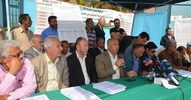
UNRWA’s crisis management cell announced on Wednesday results of the campaign of signing a memorandum addressed to the United Nations.
The crisis management cell held a press conference on Wednesday in front of the UNRWA’s headquarters in Beirut with the presence of members of the cell and representatives of Palestinian factions.
Ahmad Abdul Hadi, political official of Hamas in Lebanon, revealed in the conference that 35,000 Palestinian refugees in Lebanon have signed the memo. He said that the memo, which covered the humanitarian demands of the refugees, was addressed to the UN Secretary General Ban Ki-moon during his latest visit to Lebanon.
The letter demanded providing refugees with health and education services, approving the emergency program for Nahr al-Bared refugees, and offering complete relief to Palestinian migrants from Syria as well as providing financial budgets for such services.
The crisis management cell held a press conference on Wednesday in front of the UNRWA’s headquarters in Beirut with the presence of members of the cell and representatives of Palestinian factions.
Ahmad Abdul Hadi, political official of Hamas in Lebanon, revealed in the conference that 35,000 Palestinian refugees in Lebanon have signed the memo. He said that the memo, which covered the humanitarian demands of the refugees, was addressed to the UN Secretary General Ban Ki-moon during his latest visit to Lebanon.
The letter demanded providing refugees with health and education services, approving the emergency program for Nahr al-Bared refugees, and offering complete relief to Palestinian migrants from Syria as well as providing financial budgets for such services.
5 apr 2016
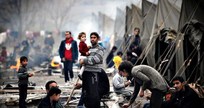
Bloody clashes between Daesh terrorists and armed opposition groups forced hundreds of Palestinian refugees in southern Syria to move to the Wadi Yarmouk and other areas for fear of being killed, a rights group said Tuesday.
According to a report by the Action Group for Palestinians in Syria, deadly clashes in southern Syria forced hundreds of Palestinian refugees to flee to such areas as the Wadi Yarmouk, al-Ajami, and al-Muzeireeb for fear of being killed.
Several among the refugees have gone homeless and others have been wandering down and out in the streets in search for safe shelters for their starved children.
The report described such a forced displacement as “a new Nakba” (catastrophe) while reports have been released on the murder of several civilian refugees in the ongoing clashes.
The Action Group said 338 Palestinian refugees residing in Deraa province were killed in bloody clashes in war-torn Syria.
The group documented the murder of 196 children in war-ragged Syria, 107 among whom were killed by shelling, 14 by sniper bullets, seven by gunshots, 17 by car bombs, and 24 due to the tough siege and medical negligence. 21 more Palestinian refugees were killed by drowning while one refugee was tortured to death.
One more Palestinian was burnt to death and another choked to death while another refugee was killed right after his abduction. At least 3,194 Palestinian refugees were killed since the outbreak of the Syrian conflict, the report further documented.
According to a report by the Action Group for Palestinians in Syria, deadly clashes in southern Syria forced hundreds of Palestinian refugees to flee to such areas as the Wadi Yarmouk, al-Ajami, and al-Muzeireeb for fear of being killed.
Several among the refugees have gone homeless and others have been wandering down and out in the streets in search for safe shelters for their starved children.
The report described such a forced displacement as “a new Nakba” (catastrophe) while reports have been released on the murder of several civilian refugees in the ongoing clashes.
The Action Group said 338 Palestinian refugees residing in Deraa province were killed in bloody clashes in war-torn Syria.
The group documented the murder of 196 children in war-ragged Syria, 107 among whom were killed by shelling, 14 by sniper bullets, seven by gunshots, 17 by car bombs, and 24 due to the tough siege and medical negligence. 21 more Palestinian refugees were killed by drowning while one refugee was tortured to death.
One more Palestinian was burnt to death and another choked to death while another refugee was killed right after his abduction. At least 3,194 Palestinian refugees were killed since the outbreak of the Syrian conflict, the report further documented.
3 apr 2016
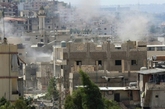
One Palestinian was killed and several others injured, Friday, amid heavy clashes between rival factions at the Palestinian refugee camp of Ain al-Helweh, in southern Lebanon, Lebanese state media reported.
A dispute between members of the Fateh Movement and “Islamist militants” escalated into gunfire for the second time this week, with sounds of RPG blasts also being reported Friday.
Lebanese state-run National News Agency (NNA) identified the slain man as Fateh member Hussein Othman.
Several families reportedly fled the camp as a result of the clashes.
“Palestinian-Lebanese contacts are underway in a bid to pacify the situation and contain the tensions,” said NNA.
While fighting had died down Friday night, Reuters reported gunfire breaking out again, Saturday morning. The renewed violence in Ain al-Helweh comes after two men were killed in clashes last week in the same camp.
It was not immediately clear if there is a connection between the two rounds of violence.
Ain al-Helweh, which lies near the Lebanese city of Sidon, has become increasingly unstable over the past year, with violent clashes last summer displacing as many as 3,000 Palestinian refugees.
Lebanon's Palestinian camps mainly fall outside the jurisdiction of the Lebanese security services. More than 54,000 registered Palestinian refugees live in the camp, who have been joined in recent years by thousands of Palestinians fleeing the fighting in Syria.
More than 450,000 Palestinians are registered in Lebanon with UNRWA. Most live in squalid conditions in 12 official refugee camps and face a variety of legal restrictions, including on their employment.
A dispute between members of the Fateh Movement and “Islamist militants” escalated into gunfire for the second time this week, with sounds of RPG blasts also being reported Friday.
Lebanese state-run National News Agency (NNA) identified the slain man as Fateh member Hussein Othman.
Several families reportedly fled the camp as a result of the clashes.
“Palestinian-Lebanese contacts are underway in a bid to pacify the situation and contain the tensions,” said NNA.
While fighting had died down Friday night, Reuters reported gunfire breaking out again, Saturday morning. The renewed violence in Ain al-Helweh comes after two men were killed in clashes last week in the same camp.
It was not immediately clear if there is a connection between the two rounds of violence.
Ain al-Helweh, which lies near the Lebanese city of Sidon, has become increasingly unstable over the past year, with violent clashes last summer displacing as many as 3,000 Palestinian refugees.
Lebanon's Palestinian camps mainly fall outside the jurisdiction of the Lebanese security services. More than 54,000 registered Palestinian refugees live in the camp, who have been joined in recent years by thousands of Palestinians fleeing the fighting in Syria.
More than 450,000 Palestinians are registered in Lebanon with UNRWA. Most live in squalid conditions in 12 official refugee camps and face a variety of legal restrictions, including on their employment.
24 mar 2016
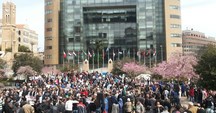
Thousands of Palestinian refugees in Lebanon participated in sit-in before the headquarters of UNRWA in Beirut demanding the cancellation of its decision to deduct health and education aid.
In the sit-in, Abu al-Nayef, member of the crisis management committee, read a statement revealing the intention of the committee to send a memo to the UN Secretary General Ban Ki-moon asking him to find a solution to the UNRWA’s financial crisis.
Abu al-Nayef pointed out that Palestinian refugees insist on maintaining UNRWA, in its capacity as the witness to their tragedy, and seek to improve its health and educational services offered for them.
The crisis management committee submitted a protest memo addressed to Ban Ki-moon, who is visiting Lebanon on Thursday, at the end of the sit-in.
In the sit-in, Abu al-Nayef, member of the crisis management committee, read a statement revealing the intention of the committee to send a memo to the UN Secretary General Ban Ki-moon asking him to find a solution to the UNRWA’s financial crisis.
Abu al-Nayef pointed out that Palestinian refugees insist on maintaining UNRWA, in its capacity as the witness to their tragedy, and seek to improve its health and educational services offered for them.
The crisis management committee submitted a protest memo addressed to Ban Ki-moon, who is visiting Lebanon on Thursday, at the end of the sit-in.
22 mar 2016

A statistical report issued, on the occasion of Mother's Day, by the Action Group for Palestinians of Syria showed that 446 Palestinian refugee women died due to the ongoing war in Syria.
Quds Press said that the report on Monday documented names of 75 Palestinian female prisoners held in Syrian jails.
The number of Palestinian arrested women is likely to dramatically increase, the report pointed out. It was highlighted in the report that there is a difficulty in collecting data of victims and prisoners in light of the Syrian secrecy in this regard.
The Action Group asked international human rights institutions to pressure the Syrian regime in order to release Palestinian refugee women from its jails and to release the names of the arrested women. It also called on all Palestinian parties to prioritize the issue of Palestinian refugee captives in Syrian jails and to work on their immediate release.
Quds Press said that the report on Monday documented names of 75 Palestinian female prisoners held in Syrian jails.
The number of Palestinian arrested women is likely to dramatically increase, the report pointed out. It was highlighted in the report that there is a difficulty in collecting data of victims and prisoners in light of the Syrian secrecy in this regard.
The Action Group asked international human rights institutions to pressure the Syrian regime in order to release Palestinian refugee women from its jails and to release the names of the arrested women. It also called on all Palestinian parties to prioritize the issue of Palestinian refugee captives in Syrian jails and to work on their immediate release.
